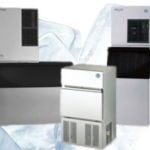

A complete guide to buying ice makers for commercial usage
Almost all businesses in the food service industry require an ice machine. With so many different styles and configurations available it is important to understand all the options to determine which ice machine will meet your business needs. With so many ice makers for sale, consider the following before making a purchase.
Configurations
Commercial ice machines fall into three main styles, with variations within each type. These are:
- Modular or ice machine head that sits above an ice or soda machine dispenser or bin. Used by large businesses.
- Under counter ice machine for businesses that don't require as much ice, such as smaller cafes or bars, and combines with a storage bin.
- Countertop ice dispenser or maker, more often found in health care settings and may dispense water too.
Ice types
Commercial ice machines produce different types of ice cubes. Common ice types include:
- Cube ice - most common, melts slowly.
- Nugget ice - common in health care industry as easier to chew than cube ice. Good for cold beverages, smoothies and blended drinks.
- Flake ice - small soft flakes that cool rapidly and can be moulded into a specific shape. Used mainly in ice displays for fish, meat and salad bars. Also used in blended drinks.
Compressor types
Choose from a water cooled, air cooled or a remote compressor.
- Air cooled - most cost effective as no additional water costs.
- Water cooled - only better than air cooled compressor if ambient temperature is above 26 degrees Celsius, environment contains high levels of grease, or requirements for air cooled units cannot be met.
- Remote cooled - usually only chosen if conditions prohibit the use of a water or air cooled unit. The condenser is then mounted outdoors, normally on a roof.
Ice machine sizing
For new businesses, your ice estimate must allow for growth. If replacing a machine, ask whether it kept up with demand. Having extra ice on demand is preferable to running out.
Multiple ice machines
Several smaller ice machines may help your operation run more smoothly than one large unit. You may require a selection of types and sizes of ice machines for your food service business to run efficiently.
Installation considerations
Consider where you wish to place your ice machines and then check to see if the space is appropriate. Things to consider are:
- Space and ventilation - adequate air flow must be maintained around the machine to ensure maximum ice production.
- Floor drain and water supply - the ice machine will need to be connected to a cold water supply with a shut-off valve. You will also require a floor drain.
- Power supply - many ice machines come without a cord or plug, so you may need an electrician to connect your machine to the power supply.
Take the above points into consideration when looking at ice makers for sale, and you should be able to fit out your business with the ideal machine for your food service needs.


Validate your login
Login
Create New Account